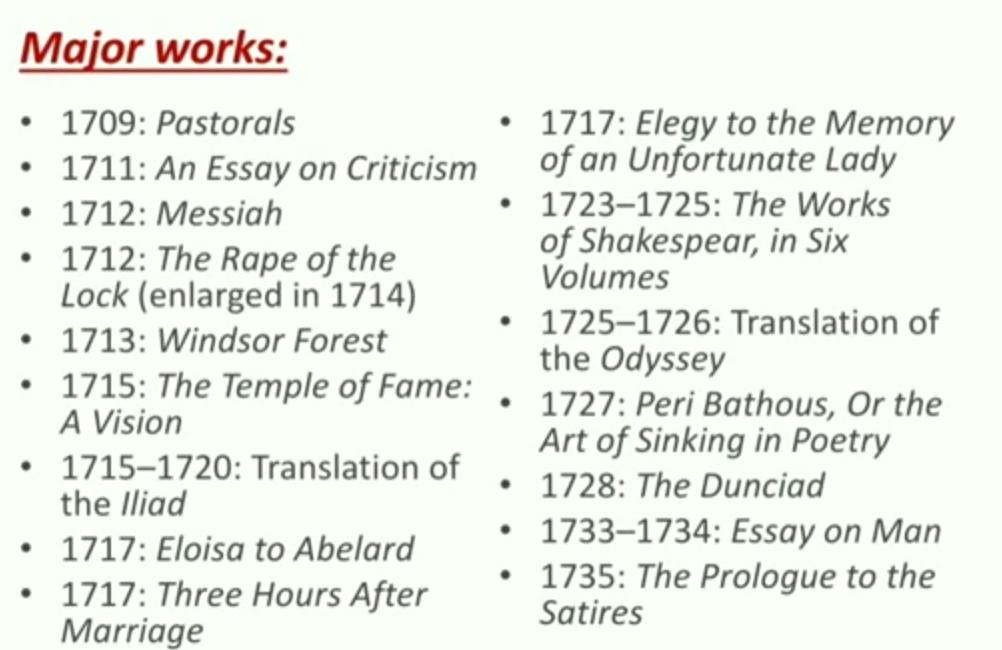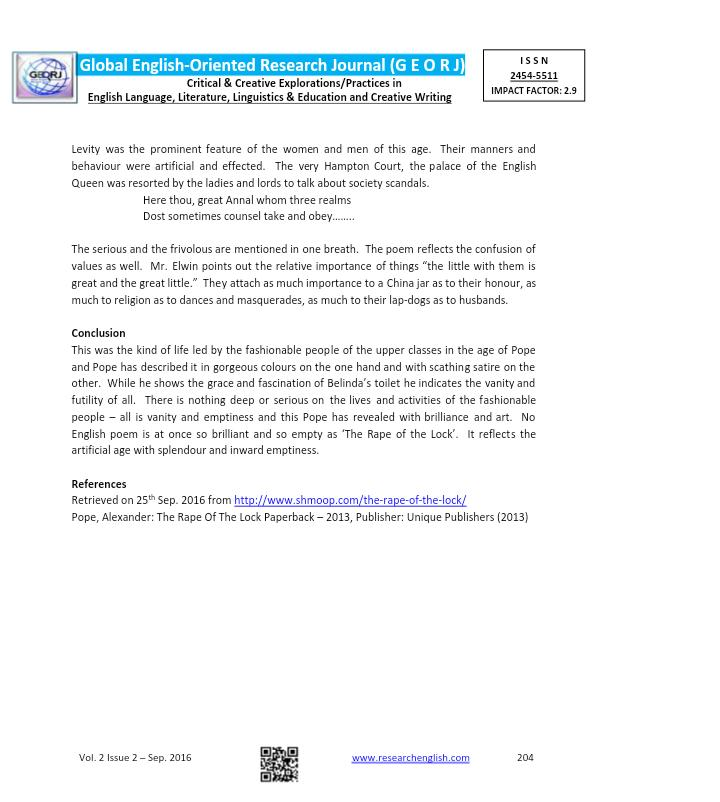Rape of the Lock
Hello readers, here I am going to write down my thinking activity and answer some questions. This blog is inspired by Vaidehi madam Department of English. This blog is on Alexander Pope's Poem.
Here I am writing down some information about the author of this poem Alexander Pope.
Alexander Pope
Although Pope was healthy and plump in his infancy, he became severely ill later in his childhood, which resulted in a slightly disfigured body-he never grew taller than 4 feet 6 inches.
# Pope's Famous Works:
- Pastorals:1709
- An Essay on Criticism:1711
- Messiah:1712
- The Rape of The Lock:1712(enlarged in 1714)
- Windsor Forest:1713
- The Temple of Fame: a vision:1715
- Three Hours After Marriage:1717
- The Dunciad:1728
- Essay on Man:1733-1734
- Ode on Solitude:1700
At times during the last month of his life, he becomes delirious. Pope died on May 30, 1744, and was buried in Twickenham Church.
# Rape of The Lock
 |
| The Rape of The Lock |
First published: In 1712 in Linto's Miscellaneous poem and Translations, then the final version was published in 1714.
The Meaning of Rape: Here "Rape" does not refer to "sexual rape". Here the word 'Rape' is derived from the Latin rapere which means "to snatch, to grab, to carry off".
Story Line: Based on a real-life incident in which a person called Lord Petre had cut off a lock of Arabella Fermor's hair without permission and thus created a breach between the two aristocratic Catholic families two.
The character of The Poem:
Belinda, The Baron, Caryl, Ariel, Umbriel.
1.) According to you, who is the protagonist of the poem Clarissa or Belinda? Why? Give your answer with logical reasons.
According to me, I see Belinda as the protagonist of the poem.
Belinda in "The Rape of The Lock" is an ambiguous character and the role played in the poem is also ambivalent. This paradox in the character of Belinda is explained by the fact that the pope looks upon her as a charming butterfly, an embodiment of physical beauty and of laudable qualities of head and heart and at the croquettes of the time and the butt of his social satire. There are times when even the praise of Belinda's attractions seems to be a mere mask for Pope's satiric attack on her, as the representative of her degenerate, unscrupulous class. One of Pope's contemporaries John Denies tried to undermine Belinda's character by saying that she is a chimera and not a character.
Belinda represents Miss Arabella Fermor of real life whom Lord Petre offended by stealing a lock of her hair. Pope wrote this poem to patch up the quarrel between the Fermors and Petres on a trivial matter. To achieve his objective he has to present Belinda as a good individual. He treats her satirically only when she represents the type of the pleasure-loving, unscrupulous and spineless aristocracy. The moralist in Pope aware of the decadence of values in the fashionable society and so he is critical of Belinda to the extent that she tries to follow all the decadent values of the society despite her natural beauty, youth, and charm. So the portrayal of Belinda is at once despicable and endearing.
"The Rape of the Lock" is a mock epic poem depicting a social drama of the 18th century fashionable society. Belinda is the main target of satire in the poem. She suffers from all the vanities, follies, and lack of moral scruples of the upper-class ladies of the time. She is a late riser, wakes up at twelve and falls asleep again, and is roused from her sleep by the licking tongue of her pet dog, Shock. When Belinda is engaged in her toilet, her beauty and charm are laid and stressed open. She is assisted by her servant Betty, in decorating and embellishing herself with cosmetics and with jewelry. She is here compared to a warrior as she dressed herself :
"Now awful beauty puts all its arms; The fair each moment rises in her charms".
She wears a sparkling cross, her looks are lively and she smiles at everyone but does not show any special favor towards anyone:
"Bright as the sun, her eyes the gazers strike And, like the sun, they shine on all alike".
She has exquisite charm, Belinda is not only exceptionally beautiful but also the cause of joy and brightness in the world where she figures, Pope describes her as the "fair nymph", "virgin" and even a "Goddess".
Logical reason: Belinda is not only beautiful, but she is also keen to display her beauty. Her pleasure ride in a boat on the Thames is a part of this program. With her repaired smiles and artistically heightened and purified blush, Belinda is playing a role most of the time. Her role is that of an amiable beautiful maid who rejects without causing any offense and scatters her smiles on all, even at her grief after the snipping off the Lock of her hair, which is a studied art. As Pope puts in:
"Then seen the nymph in beautious grief appears, Her eyes half-langu, half-drawned in tears".
2.) What is beauty? Write your views about it.
Beauty the word is a combination of different qualities. Like shape, color, and forms. but the point of view of seeing the beauty is different in all humans some see the aesthetic senses, especially sight.
According to me, Beauty can be described as a feature that makes something look more pleasurable. In today's world, beauty has become a judging standard. However, one should realize that true beauty lies in the heart of the person. Beauty lies in the eyes of the beholder. Often, one thing that is looking attractive to us may not look beautiful to the other person. Hence, true beauty is not physical beauty. True beauty shows how beautiful the character of a person is. Inner beauty can touch the soul and make it feel joyful, there is a simple yet deep impact it can make over any person.
I also think that real beauty is our confidence which is make us more beautiful. and confidence is more important than looks.
When Priyanka Chopra won the miss world she was not beautiful as the others so she asked to judge I am not beautiful like these other competitors so why still did you choose me? Judges told her that her confidence made her more beautiful. and that's why we give you this title.
Attraction is beauty. But money attraction is not a beauty. Looks and also personality attract us. And also the understanding with the person which one close to your heart and he or she understand your all your problems and all situations without telling anything to him or her this is a natural beauty.
Sometimes we see that many proposals of marriage were rejected by men because they want beautiful wives that judge girls by their beauty, not for their abilities. We have the best example of Fair and lovely this company changed its name to Glow and lovely because this advertise meant was hurt people's sentiments. Because in this advertisement they used the word Fair and also they saw in the advertisement that black skin girl was used the fair and lovely and his skin tone was changed. How can it be possible..?
3.) Find out a research paper on "The Rape of the Lock". Give the details of the paper and write down in brief what it says about the Poem by Alexander Pope.
4.) Write your views about the significance of hair. Is it symbolic?
Scholars, psychics, and beauty buffs agree the hair on your head makes you more pretty and powerful. Some cultures believe that hair is an extension of your spirit or soul..and your hair also connects you to the earth with its downward growth.
Hair symbolizes physical strength and virility; the virtues and properties of a person are said to be concentrated in his hair and nails. It is a symbol of instinct, female seduction, and physical attraction. Baldness may suggest sterility. Hair flowing depicts freedom and looseness; the unwilling removal of hair may be a castration symbol. Carries the context of magical power; witches had their hair shaven off, as well as in the Bible, in which Samson loses all his power when his locks are stripped. Heavy relations to fertility and even love the quantity is related to love potential.
country wise and beauty wise people have different types and also different types of hair colors. Hair color carries symbols too:
golden- related to SUN symbolism
white - eternity
red- demoniacal, Satanic
violet -associated with goddesses
brown/black - chthonic forces
green - having to do with the sea, water
The tradition of giving a lock of hair to a loved one may not seem romantic now, but at one point, it was considered a token of affection. In fact, because hair does not decompose, it was cherished as a symbol of eternal life…a reminder of mortality, and immortality…a source of comfort.
Thank you for reading...



















No comments:
Post a Comment